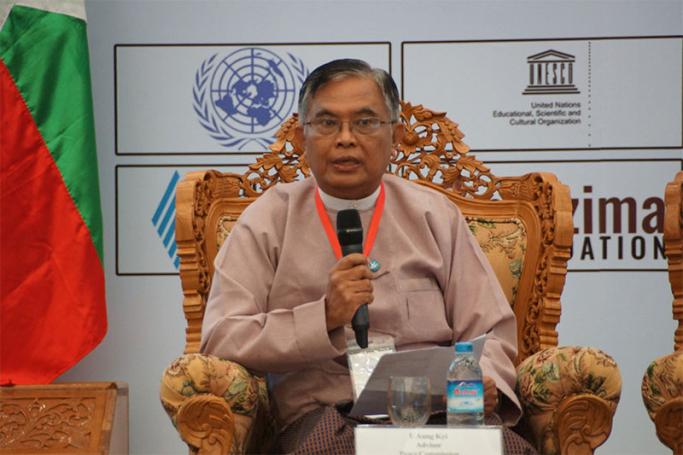Panelists said lessons should be learnt from history and from other countries in the drive to bring peace to Myanmar.
Five speakers spoke of the challenges in a session entitled, “Transition from war to peace: Conflict Resolution, Reconciliation and the building of an inclusive multi-national state” during the Forum for Myanmar Democratic Transition being held over this weekend in Nay Pyi Taw.
As U Aung Kyi, Advisor to the Peace Commission said that lessons could be learnt from other countries that have sought and succeeded in finding peace, even if Myanmar’s experience may be different.
As he explained, peace is very fundamental. Negative peace is practiced as the absence of war. But what they aim for in Myanmar is the positive peace without violence, with human rights and dignity.
“Positive peace is a process which can be reached through strong commitment,” he said.
He said it was necessary to act very quickly to find a lasting peace.
Daw Zin Mar Aung, Member of Parliament, Pyithu Hluttaw said it was important to stress the parliament’s role in the peace process.
“MPs are the agents of the people representing the people, talking to people and explain the people what is happening,” she said.
U Aye Maung Kyaw, Senior Consultant, Center for Myanmar Affairs Studies, noted the peace process had been going on for five or six years and it was now called the 21st Century Panglong, in reference to the 1947 Panglong talks prior to the country’s independence.
He said we have to learn from history in order to prepare for the future.
In theory, the peace process should be smooth but in practice, in the negotiations, there were many problems, and different opinions and perspectives.
Daw Ja Nan Lahtaw, Director, Nyein Foundation, stressed that civil society needs to be involved in the peace process.
She said the tendency was to only listen to the leaders, whereas a bottom-up approach was needed with the participation of civil society.
You are viewing the old site.
Please update your bookmark to https://eng.mizzima.com.
Mizzima Weekly Magazine Issue...
14 December 2023
New UK Burma sanctions welcome...
13 December 2023
Spring Revolution Daily News f...
13 December 2023
Spring Revolution Daily News f...
12 December 2023
Spring Revolution Daily News f...
11 December 2023
Spring Revolution Daily News f...
08 December 2023
Spring Revolution Daily News f...
07 December 2023
Diaspora journalists increasin...
07 December 2023
Thirty horse riders take part in NLD campaign rally












